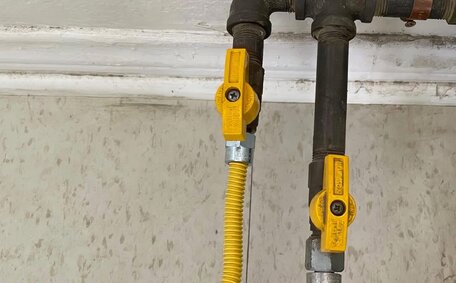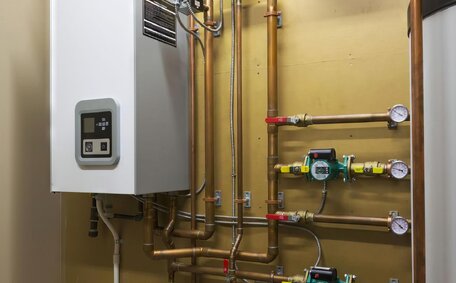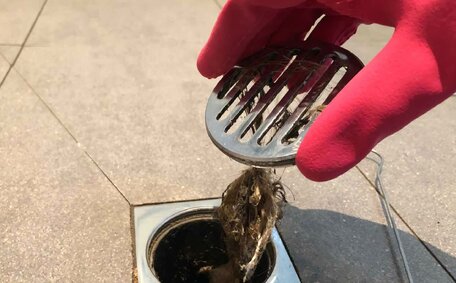Introduction to Common Plumbing Pipe Materials
In Jannali and Sydney, typical plumbing materials—copper, PEX, PVC, galvanised steel, and cast iron—are pivotal for ensuring a plumbing system’s longevity and durability.
Plumbing materials have advanced with the introduction of durable plastics, but many older homes in Jannali still feature traditional materials like copper, cast iron, galvanised steel, and ABS pipes.
We’ll delve into the lifespans of popular pipe types found in Jannali homes. You’ll also discover what you need to know about the critical signs that indicate when pipe replacement may be necessary to avert leaks or other costly plumbing headaches.
We will discuss factors affecting durability, such as material, maintenance, water pressure, and water content.
Average Lifespan of Different Pipe Types
The life expectancy of plumbing pipes is contingent on their material makeup:
- Copper pipes - May endure up to a century if meticulously maintained, although susceptible to pinhole leaks with age.
- PEX pipes - Can last over 100 years. Very durable plastic piping.
- PVC pipes - Lifespan that can last around 100 years if properly maintained. Vulnerable to UV light and chemical exposure.
- Cast iron pipes - These pipes usually have a lifespan of 50-100 years. Brittle with age and particularly vulnerable to root intrusion.
- Galvanised steel pipes - Last approximately 50 years before corrosion sets in causing leaks.
Copper and PEX pipes are highly durable, whereas galvanised steel pipes typically have shorter lifespans. Water pressure, mineral-rich water, and maintenance practices can influence the average lifespan of pipes, which exceeds 50 years, regardless of material.
Stay vigilant for wear indications, including reduced water pressure, leaks, and discoloured water, which can signal the need for pipe replacement.
Copper
Ltype copper pipes, known for their durability and longevity, offer a reliable option for home plumbing systems. Properly maintained copper pipes in your home can last well over an average of 70-100 years.
Several crucial factors dictate the longevity of copper pipes:
- Water chemistry - Copper pipe is a type of pipes very well-suited for most conditions but can be corroded faster by acidic water.
- Water pressure - Elevated pressure strains pipes carrying both hot and cold water, potentially causing pinhole leaks over time.
- Maintenance – Regularly cleaning buildup and inspecting for leaks are essential in preventing pipe deterioration.
To maximise the lifespan of copper plumbing, homeowners in Jannali should:
- Consider water treatment if pipes are exposed to acidic water
- Ensure your plumbing includes pressure reducing valves, which can easily manage water pressure over 80 PSI
- Inspect visible pipes annually for corrosion and leaks
- Replace any sections that show wear, leaks or significant buildup
Copper pipes can last 50-100 years if well-maintained. However, deteriorating pipes requiring replacement should be addressed quickly to avoid damage.
PEX
PEX, or cross-linked polyethylene piping, has risen in popularity for home plumbing due to its flexibility and durability, potentially lasting beyond 100 years.
The expected lifespan of a PEX pipe system is over 100 years. The plastic material is designed to be long-lasting and is not as prone to the pitting and corrosion issues that can affect metal pipes over time.
A disadvantage is PEX pipes’ susceptibility to brittleness from UV light or chemicals. Protecting pipes from sunlight and using PEX-approved cleaners can prevent early degradation.
For Jannali homeowners, it’s critical to appreciate that PEX offers a versatile and robust piping solution that should serve the plumbing system reliably and last least 50-70 years when properly installed and maintained. It’s important to choose a reputable plumbing company to install PEX correctly and ensure all fittings and connections are solid.
With correct installation and safeguarding from chemicals and UV light, PEX systems can endure over a century, free from repairs or replacements.
PVC
PVC, or polyvinyl chloride, is a widely-used plastic material for residential sewer systems. Though rarer, clay pipes and properly installed PVC may last indefinitely, frequently cited to endure 50-100 years or longer.
Made from corrosion-resistant material, PVC pipes offer an extensive lifespan and, when replacement is needed, provide a cost-effective alternative to copper lines. Lead pipes can also become brittle and crack under UV exposure or chemical contamination.
For the Jannali region, PVC stands out as an excellent material for underground water pipes intended for drainage applications. One downside is that hard Sydney water can cause scale buildup and clogs over time if not flushed out regularly. Small offset joints, which can fall out of sight and out of mind, also pose points of weakness should pipes shift underground because of root or soil movement.
To get the longest functional lifespan from PVC drain piping, Jannali homeowners should:
- Regularly engage a plumber to flush and inspect your PVC sewer line for peak performance
- Ensure all joints and connections remain secure
- Address any signs of leakage, off-gassing or damage immediately
Taking good care of PVC drainage systems allows them to serve the home reliably for 100+ years. But signs of deterioration shouldn’t be ignored - replacement of affected sections or pipe relining may be needed to restore integrity and prevent backups.
Cast Iron
Cast iron pipes have been used extensively in older Jannali homes for drainage and sewer lines. Properly maintained cast iron pipes can last 75-100 years.
Durable yet brittle, cast iron piping often lasts 50 years and can crack under pressure from tree roots or foundation shifts. Rust and corrosion buildup, often due its exposure to various factors, can also reduce lifespan.
To maximise longevity of cast iron drainage lines, Jannali homeowners should:
- Have pipes inspected every 2-3 years using a sewer camera
- tackle any fractures, leaks, or accumulations promptly
- Consider pipe relining if deterioration is spotted
- Eventually replace deteriorating cast iron pipes
Diligently maintained cast iron plumbing can last 50 years to a century, reliably serving households. However, after 50-75 years, replacement is typically necessary, particularly when your house’s pipes show wear, damage, or severe rust and scale buildup, which can impede flow.
Galvanized Steel
Stainless steel sinks and galvanised pipes have an average lifespan of 20-50 years. The zinc coating applied to the steel pipes helps resist corrosion but will eventually break down exposing the metal underneath.
Factors impacting galvanised pipe lifespan include:
- Water chemistry - Accelerated corrosion can be caused by acidic water
- Water pressure - Excessive force used on water conduits intensifies stress
- Pipe maintenance - Lack of flushouts shortens lifespan
For Jannali’s older homes with galvanised plumbing, it’s recommended to conduct regular inspections for signs of deterioration such as low water flow or leaks. Experts often recommend you replace your galvanised pipes after they’ve served for more than 50 years to sidestep sudden leaks or water damage.
Replacement options encompass various types of plumbing materials like copper, PEX or PVC. Choosing rigid pipes over galvanised offers a more enduring solution for the next 50 years or more.
Factors Influencing Plumbing Pipe Durability
There are several key factors that impact how long different types of plumbing pipes will last in Jannali homes:
- Pipe material - The innate durability and thickness of the pipes your home can utilise, such as copper, PEX, PVC etc., affect lifespan.
- Water pressure - High pressure causes more stress and can lead to pinhole leaks or cracks over time.
- Water composition - Mineral content and acidity corrodes pipes faster, especially metal types.
- Usage/flow - Frequently used pipes wear faster but stagnant water also causes corrosion.
- Installation - Poor installation with weak joints or connections causes failures.
- Maintenance - Lack of routine flushouts and inspection misses deterioration signs.
Sydney’s hard, mineral-rich water can make pipes more susceptible to stress and wear, particularly demanding on various plumbing components. Galvanised steel and cast iron pipes often exhibit lifespans of over 50 years if they are well-maintained. Even robust copper pipes may develop pinholes after 50-70 years.
PEX and PVC pipes last longer if protected from UV exposure, high water pressure and chemical contamination risks. With adequate maintenance, these pipes can last over a century in Jannali homes.
Signs Your Pipes May Need Replacing
There are a few key signs that indicate your plumbing pipes may need replacing:
- Reduced water pressure - This is a Common symptom of corrosion, buildup, or other factors that are restrictive to the flow within your water supply channels. Copper pipes prone to pinhole leaks will often have dropping pressure first.
- Discoloured water - Rusty, blue-green or murky drinking water often signals corroding galvanised or ageing pipes, which may soon end their usability cycle, leaching into the supply lines. Particles can also break loose from scale buildup inside old pipes.
- Clanging or banging noises - Loud pipe noises can mean there is a partial blockage or buildup accumulation rattling around when air or water passes through deteriorating pipes used in water supply.
- Visible corrosion or leaks - Exposed supply pipes with noticeable corrosion, rust spots, pinholes or watermarks likely need replaced. Cast iron pipe cracks or PVC UV damage would also be visible.
Bearing these warning signs in mind, if you suspect your home’s plumbing may be compromised, it is wise to call a professional plumber for an inspection to gauge wear and tear and determine if pipe replacements are warranted. Persisting with compromised water supply pipes, impacted by wear and tear, poses risks including leaks, contamination or potential blockages over time.
While pipes like copper and PEX can last 70-100 years, ageing galvanised steel at 50 years old should be swapped out proactively. Catching problems early allows for targeted repairs or replacements before failure occurs at inconvenient times.
Best Practices for Longevity
There are several key steps Jannali homeowners can take to maximise the lifespan of their plumbing:
- Have pipes routinely inspected every 2-3 years to spot any early signs of wear using high-resolution sewer cameras. This allows targeted repairs or replacements before failures occur.
- Consider installing a whole-house water filtration and softening system if dealing with acidic or mineral-rich water to decelerate pipe corrosion. Improve your water quality to preserve your plumbing system.
- Install pressure reducing valves on main lines for your tank water system if the pressure exceeds 80 PSI. Unnecessary strain from high pressure can wear down piping and systems like water heaters.
- Develop preventive maintenance routines that include pipe flushing, fixture cleaning, water heater assessments, and more. Well-cared for plumbing ensures even your water heaters last significantly longer.
Jannali Plumbing’s licenced services can manage all testing, inspections, maintenance, and repairs, extending your pipes’ lifespan. Proactive plumbing care can cut long-term costs and prevent disruptions from unexpected pipe replacements.






